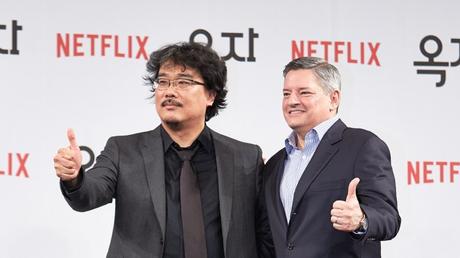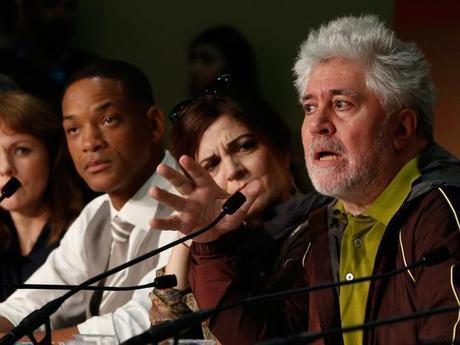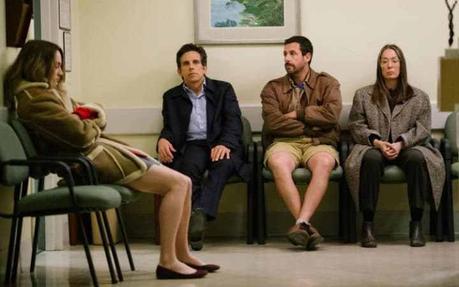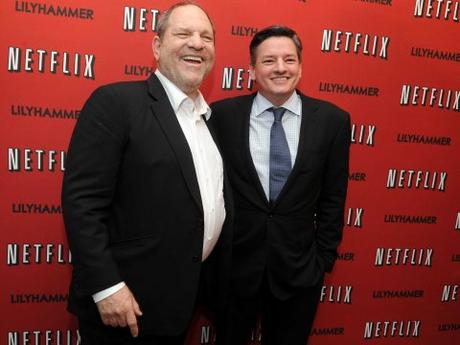
Among all the film festivals in the world, Cannes has always stood out as being especially rowdy. In that way, it's the Golden Globes of film festivals just with more prestige and economic importance. As such, it is not uncommon to be booed at Cannes.
Even so, you just know there had to be an extra helping of hate and schadenfreude behind the boos which recently greeted a screening of Netflix's Okja. Reports vary as to whether the booing was in response to the Netflix logo preceding the film or to the unfortunate fact that Okja was initially projected in the wrong aspect ratio or if it was a combination of the two. Plus, while the booing has been widely reported it's gone somewhat unnoticed that a later screening of Okja went by without issue and actually received a standing ovation at the end because, oh, yeah, director Bong Joon-ho made an amazing movie. Still, Netflix went into Cannes facing open hostility, and the moment they screwed up something as basic as properly projecting a movie their critics pounced, smelling blood in the water.
But why? What has Netflix ever done to the people at Cannes to deserve this?
Oh, this isn't really about Netflix; it's about economic survival. Netflix is a market disruptor unlike anything in the history of film since the invention of the TV, and there remain pockets of the world which openly resist such change because it is in their best economic interest to cling to old business models. Remember that Cannes, as The Los Angeles Times put it, is really "a sort of trade show that runs in parallel to the auteur screenings and red carpets" and "serves as a bazaar of international rights for many B pictures and below."
By reputation, Cannes is a party festival, with celebrities regularly engaging in insane publicity stunts and many a yacht party raging into the night, but it is also a time when an inordinate amount of business gets done. This year, the global acquisitions executives from TV and film and art-house theater owners in attendance feel especially under assault since Netflix is running not just Okja but also Noah Baumbach's Ben Stiller/Adam Sandler drama The Meyerowitz Stories in competition. Furthermore, Will Smith is sitting on the grand jury this year, and everyone is well aware that his next movie will come out on Netflix and not in theaters. As a result, the discussion at Cannes has centered around Netflix before the festival even began.
Is it still a movie if it never plays in movie theaters?There was initially a debate as to whether or not Okja and The Meyerowitz Stories should even be allowed into the competition for the festival's prestigious Palme d'Or since neither film will actually play in French theaters. The resulting outcry from French theater owners forced Cannes organizers to enact a rule change ensuring that from this point forward all films submitted for competition must commit to distribution in French theaters. Curiously, the press release announcing the change included the following shade-throwing at Netflix: "The festival asked Netflix in vain to accept that these two films could reach the audience of French theaters and not only its subscribers. Hence the festival regrets that no agreement has been reached."
What the press release didn't say is the reason Netflix won't put its movies into French theaters is because doing so would prevent those films from going to SVOD for three years thanks to a ridiculously out-of-date French law. Until that changes, no streaming service wants anything to do with French theaters.
So, it must be especially galling to theater owners that both Okja and The Meyerowitz Stories are among the best-reviewed films of the festival so far. Hell, to the shock of everyone Adam Sandler got a standing ovation for his surprisingly nuanced work in Meyerowitz. The star of Sandy Wexler, ladies and gentlemen.
A testy opening press conference Will Smith dominated the Grand Jury press conference last week, overshadowing fellow jury members like Jessica Chastain or Paolo Sorrentino. The press simply could not get enough stories about how one of the world's biggest movie stars ended up at Cannes not promoting a movie but instead sitting in judgement of other movies, a responsibility he swears he's taking seriously. However, while he might be the biggest star on the jury he's not actually the one in charge. That duty falls to Cannes jury president Pedro Almodovar, who used the press conference to weigh in on the Netflix controversy by championing the traditional movie-going experience:
Will Smith dominated the Grand Jury press conference last week, overshadowing fellow jury members like Jessica Chastain or Paolo Sorrentino. The press simply could not get enough stories about how one of the world's biggest movie stars ended up at Cannes not promoting a movie but instead sitting in judgement of other movies, a responsibility he swears he's taking seriously. However, while he might be the biggest star on the jury he's not actually the one in charge. That duty falls to Cannes jury president Pedro Almodovar, who used the press conference to weigh in on the Netflix controversy by championing the traditional movie-going experience:
"I personally do not conceive, not only the Palme d'Or, any other prize being given to a film and not being able to see this film on a big screen. All this doesn't mean I'm not open to or don't celebrate the new technologies. I do. I'll be fighting for one thing that I'm afraid the new generation is not aware of. It's the capacity of the hypnosis of the large screen for the viewer. The size [of the screen] should not be smaller than the chair on which you're sitting. It should not be part of your everyday setting. You must feel small and humble in front of the image that's here."
Smith, however, just didn't understand the objection, using his three kids as examples while defending Netflix:
"They go to the movies twice a week and they watch Netflix. There's very little cross between going to the cinema and watching what they watch on Netflix in my home. In my house, Netflix has been nothing but an absolute benefit. They get to see films they absolutely wouldn't have seen. Netflix brings a great connectivity. There are movies that are not on a screen within 8,000 miles of them. They get to find those artists."
This set the tone for the festival, leading to stars defending their current employer, Netflix, instead of getting to talk about their movies.
The stars defend Netflix's honor Meyerowitz's Stiller, Sandler, Dustin Hoffman and Emma Thompson have either sued for peace or blamed Hollywood for creating this mess in the first place:
Meyerowitz's Stiller, Sandler, Dustin Hoffman and Emma Thompson have either sued for peace or blamed Hollywood for creating this mess in the first place:
Stiller: "I don't know why the studios have become so adverse to making interesting films and taking chances. I guess it's about money. These studios are owned by big conglomerates and they're not independent studios making films. They have a huge profit margin, so they make movies that can make a lot of money. Unfortunately, that means the really good interesting movies aren't getting made. Now, studios are not headed by people who have that appreciation for creativity."
Sandler: According to Variety, Sandler praised Netflix Chief Content Officer Ted Sarandos creates a "cool feeling," because he comes across as a fan of film, rather than just a businessman.
Hoffman: "The industry changed, and [Netflix] got on in the first act of the change."
Thompson: "People will make art, and we'll watch in different ways, that's for sure. But it's not going to kill going to the cinema."
Okja director Bong Joon-ha also spoke up, making quite the pitch for Netflix as a home for guaranteed distribution and near-unprecedented artistic freedom:
"At first, Darius Khondji, my cinematographer, and I wanted to shoot 'Okja' on 35mm, but Netflix insisted that all Netflix originals be shot and archived in 4K. Khondji then figured that we would use Alexa 65, which equates to a 70mm film in digital format. It makes a great cinematic vibe. [Other than that], Netflix guaranteed my complete freedom in terms of putting together my team and the final cut privilege, which only godlike filmmakers such as Spielberg get"
As for the controversy over his film competing at the festival, meh, it's no big deal to him: "All films are eventually archived in DVDs, Blu-rays and in other digital media after screening in theaters for a while. Considering that as all films' life cycle, I don't think making a film backed by Netflix makes much difference for me as a filmmaker."
Not the first time the French have objected to Netflix If all of this is giving you a sense of deja vu it's probably because this is not the first time Cannes has been the locale for a "Netflix will be the death of us all!" outcry from the locals.
If all of this is giving you a sense of deja vu it's probably because this is not the first time Cannes has been the locale for a "Netflix will be the death of us all!" outcry from the locals.
Two years ago, a Q&A session with Netflix's Ted Sarandos turned contentious when he was asked by Andre Lange of the government-backed European Audiovisual Observatory, "Are you aware that in five, 10, 15 years you will destroy the current ecosystem of film production in Europe?"
Sarandos admirably refrained from arching his fingers together and letting out a maniacal laugh before uttering, "And I would have gotten away with it too, if it weren't for you meddling tax collectors." COO's of corporate powerhouses have to be more sensitive than that, but that would have been the response jokingly expected from those who view Sarandos as the bringer of death to their livelihood.
To understand this particular debate, you have to first understand what the heck Lange was talking about. As Bloomberg explained, "France requires national broadcasters and distributors to contribute to local film funds. Foreign services like Netflix are exempt." It's not just France, though. Critics all throughout Europe worry Netflix's global expansion will put local government-subsidized productions out of business. To put it another way, in the States the debate between Netflix and the film studios relates to when movies get released (i.e., whether or not to end the windowing system which has been central to the flow of revenue for decades); in Europe, the debate is more about whether or not movies will even get made since the film financing formula at play in Europe is very different than the one at play here.
Naturally, Sarandos doesn't see this in we win-you lose binary terms. He told Lange, "We won't take one cent of French tax dollars to produce [Netflix Original French TV show Marseilles] that show. Our plan is not to draw from those funds, not to pay into those funds because we are creating content for the world." And Harvey Weinstein, who was reportedly in attendance precisely because he suspected Sarandos might need a friendly voice in the crowd, joined in, "[Netflix] are visionaries. A million people in America watch French-language films because of the service. I hope the government spends money on hospitals and children. I hope the market is so good [films] don't need government funds."
Placating the audience, Sarandos explained, "Nothing we're doing is meant to be anti-theater or anti-cinema. People will still go to movies. But I think people want choice, and if you don't give them choice it will only harm studios' interests."
The sentiment seemed to go over well at the time, but here we are two years later and as the world of film distribution continues to change at an unprecedented pace traditionalists still seek to demonize Netflix.
Netflix, savior (and devourer) of mid-budget cinema Let's take a step back and use two people to measure what's wrong and what's right about the film industry in general at this very moment.
Let's take a step back and use two people to measure what's wrong and what's right about the film industry in general at this very moment.
First up, Tony Vinciquerra. He's the man Sony recently picked to replace Michael Lynton as CEO of Sony Pictures Entertainment, where he will now be in charge of both the studios' film and TV divisions. What qualified him for the job? He used to be the head of the Fox Networks Television Group and sat on the boards of a lot of entertainment companies. But he has little actual experience with TV production and none with film production. He's a suit, a brand manager who might whip the studio into fiscal shape in time to be sold off, possibly to Les Moonves at CBS. Someone like Tony Vinciequerra being in charge of a film/TV studio is what's wrong with Hollywood. See also: Kevin Tsujihara at Warner Bros.
Then there's Scott Stuber. Stuber rose up the ranks in Hollywood just like you're supposed to, eventually serving as a producer and Co-President of Worldwide Production at Universal for nearly a decade where he initially oversaw films like The Fast And The Furious and The Bourne Identity from afar before getting hands-on producing experience with films like Ted, Central Intelligence and Safe House. When the chief job over at Paramount opened up after Brad Grey's firing Stuber seemed like a hot candidate, but why bother with a failing company like Paramount where the last guy was fired because the Board was trying to take away his greenlight authority?
So, Stuber took a different job instead: running Netflix's feature film division where he intends to release 40-50 films a year, an ambitious production slate fueled by aggressive festival acquisitions (Netflix did try to devour Sundance whole this year) and bold investments in homegrown products, like Will Smith's Bright. Stuber may or may not succeed at the job, but he at least comes to it with ample experience making movies. He's not a suit. He's not someone who just will make sure the trains run on time. He's someone there to make movies. See also: Ted Hope at Amazon.
And this keeps happening. People who a decade ago would have been natural successors to run film studios are now bolting for streaming companies and TV because that's where the true creatives want to be. That's largely where cinema, if you think of cinema in somewhat elitist terms, now resides. What makes it into actual theaters is more childhood-prolonging nostalgia, transparent cash grabs (*cough* Baywatch *cough*) and family entertainment than cinema, except for that finite period in November-January when Oscar movies get to come out and play (plus I would push back on own generalization here since what was Logan other than a pure cinematic experience).
As Sarandos told Vanity Fair in 2015, "There are movies that people really want to watch that are no longer being made and no longer being put in movie theaters because studios don't want to make them anymore."
But if Netflix is going to make those movies France wants to be able to play them in their movie theaters because that is traditionally how movies have been exhibited. The standing ovations which have greeted Okja and The Weyerowitz Stories prove that Cannes, often the harshest audience you can find at a film festival, recognizes quality cinema wherever it might come from, but the booing indicates they don't exactly like that the best cinema lately is streaming directly into our homes, not playing in a darkened room somewhere near us. That's simply the way things are going, and the understandable response from those whose careers are tied to the way things used to be is indeed a confused mixture of applause (for the art) and booing (for the commerce).

